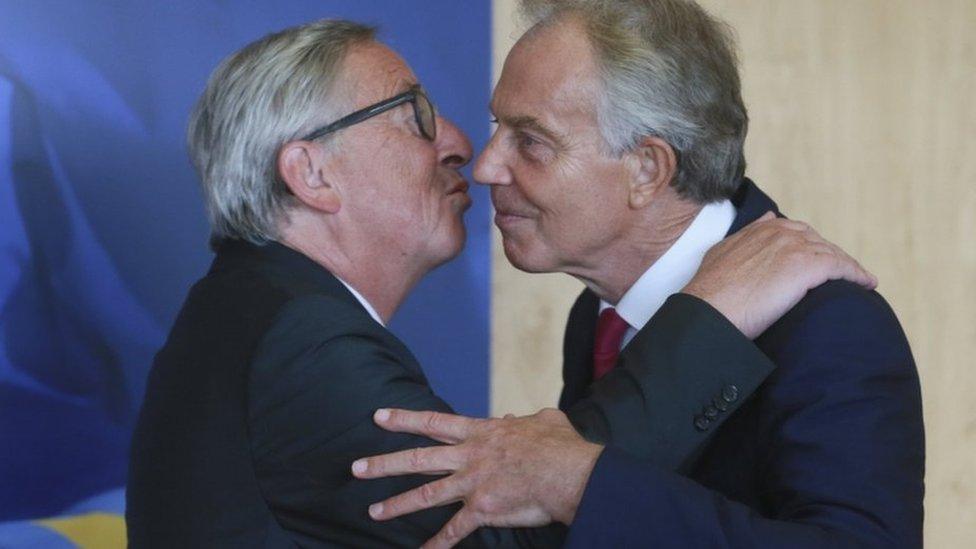'Divorce bill' row frustrates Brexit talks
- Published
- comments
Michel Barnier, EU's chief Brexit negotiator: UK's requests are "simply impossible"
Both the UK and EU have expressed frustration at the pace of Brexit talks amid disagreement over the size of the UK's "divorce bill".
EU negotiator Michel Barnier said the UK did not feel "legally obliged to honour its obligations" after Brexit.
He said "no decisive progress" had been made on key issues, following the third round of talks.
But Brexit Secretary David Davis said the UK had a "duty to our taxpayers" to "rigorously" examine the EU's demands.
And he urged the EU to be "more imaginative and flexible" in its approach.
'Impatient, not angry'
During a joint press conference, Mr Barnier acknowledged there had been some "fruitful" discussions on the issues surrounding the relationship between the Republic of Ireland and Northern Ireland, but he struck a pessimistic tone overall.
He stressed that he was "impatient… I am not angry… I am impatient and determined" about the progress of negotiations, adding that "time is flying" and the EU was willing to intensify the "rhythm" of talks.

Analysis by BBC Europe Correspondent Kevin Connolly
Behind their polished podium performances, it's clear there are major gaps between the stance of Michel Barnier and David Davis which are not being bridged.
Money is the big sticking point of course, although the phraseology around the issue is a little more elegant than that, and the language at these moments can give you a real feel for the underlying atmosphere.
Mr Barnier says that after this week "it's clear that the UK doesn't feel legally obliged to honour its obligations".
Mr Davis claims it's natural that the UK would want to "interrogate rigorously" any demand placed on its taxpayers. But he is also careful to note that Britain is a country that meets its obligations - moral as well as legal; it just expects them to be properly specified.

David Davis, Brexit secretary: "I think it's fair to say we've seen some concrete progress"
The UK wants to begin trade talks as soon as possible, but Brussels insists that discussions about the future relationship after Brexit can only begin once "sufficient progress" has been made on the arrangements for withdrawal - including on the so-called "divorce fee".
Mr Barnier said that at the current rate of progress, he was quite far from being able to recommend opening parallel talks on a future trade relationship with the UK.
He cited two areas where "trust" needed to be built between the two sides - on citizens' rights and the financial settlement, stressing that 27 members of the bloc should not have to pay for obligations taken by 28.
Claiming there had been a shift in the UK government's approach, he said: "In July the UK recognised that it has obligations beyond the Brexit date but this week the UK explained that these obligations will be limited to the last payment to the EU project before departure."
No figure has yet been put on the payment, but European Commission president Jean-Claude Juncker has suggested it could come in at around 60 billion euro (£55bn), while unconfirmed reports have put it as high as 100 billion euro (£92bn).
'Difficult exchanges'
Mr Davis defended the "rigorous" line-by-line examination of the EU's demands carried out by British officials in response to the "unspecified but undoubtedly large" sum demanded by Brussels.
He added: "It will, of course, lead to difficult exchanges - nobody will pretend it was anything but a tough exchange this week - but I think the British taxpayer would expect nothing less."

Former Labour PM Tony Blair was also in Brussels for talks with European Commission President Jean-Claude Juncker
Mr Davis also told reporters the talks had exposed how the UK approach was "substantially more flexible and pragmatic than that of the EU".
"This week we have had long and detailed discussions across multiple areas and I think it's fair to say we have seen some concrete progress, and Michel referred to one but there's more than that," he said.
"However, as I said at the start of the week, it's only through flexibility and imagination that we will achieve a deal that works truly for both sides.
"In some areas we have found this from the [European] Commission's side, which I welcome, but there remains some way to go."
He added: "Beyond the debates about process and technicalities, at the heart of this process, must be a desire to deliver the best outcome for the people and the businesses of the European Union and the United Kingdom," he added - particularly on citizens' rights.